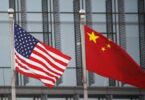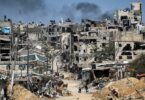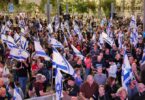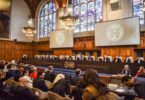Tzvi Kahn
They lay in neat, organized rows, a colorful medley of matériel on the deck of the USS Monterey. Some 3,000 Chinese Type 56 assault rifles. Hundreds of heavy machine guns and sniper rifles. Several hundred rocket-propelled grenade launchers. Dozens of Russian-made advanced anti-tank guided missiles.
The Monterey had seized the weaponry only days earlier, on May 6, from a dhow in the Arabian Sea. According to an American defense official, an initial investigation found that the vessel came from Iran. The likely destination: Yemen, where, since 2015, Tehran-backed Houthi rebels have waged a bloody war against a Saudi-led coalition aligned with Yemen’s internationally recognized government.
Tehran’s latest shipment of weapons to the Houthis, who officially call themselves Ansar Allah, or “Partisans of God,” constitutes one of many that the Islamic Republic has dispatched in recent years. U.S. naval forces have frequently intercepted the deadly cargos. “Iran’s support to the Houthis is quite significant, and it’s lethal,” said the American special envoy for Yemen, Tim Lenderking, in April. According to a UN panel, the arms transfers violate UN Security Council Resolution 2216, which passed in 2015 and prohibits the transfer of weapons to designated Yemeni combatants.
For Canada, the proper response to this illegal arms trafficking is to designate Iran’s Islamic Revolutionary Guard Corps (IRGC) – the entity that carries out such missions for the clerical regime – as a terrorist organization. In 2018, the House of Commons overwhelmingly passed a non-binding motion calling on the Canadian government to “immediately designate” the IRGC as a terrorist entity. Prime Minister Justin Trudeau has yet to do so.
The arms shipments come as the conflict in Yemen worsens. On May 7, President Joe Biden’s administration condemned the Houthis for refusing to institute a nationwide cease-fire, allow the free flow of goods into Yemen, and begin peace talks. “The Houthis passed up a major opportunity to demonstrate their commitment to peace,” the State Department said. Instead, the Houthis are “exacerbating dire conditions for already vulnerable, internally displaced Yemenis.”
On May 12, the UN special envoy for Yemen, Martin Griffiths, told a virtual meeting of the UN Security Council that the Houthis have intensified the bloodshed by launching an offensive against Marib, a key government stronghold. The attack “has caused an astonishing loss of life, including children who have been mercilessly thrown into the battle,” said Griffiths. Ansar Allah, he added, must “immediately stop its attack on Marib.” Yet on Saturday, a Houthi ballistic missile fired at Marib killed at least 17 people, including a five-year-old girl.
In fact, U.S. policy has incentivized the Ansar Allah’s intransigence by surrendering Washington’s leverage with Iran without securing concessions from the Houthis. In the first weeks of his presidency, Biden revoked former President Donald Trump’s designation of Ansar Allah as a terrorist organization. Biden also ended U.S. military support for Saudi Arabia’s offensive operations in Yemen, arguing that they have led to massive human rights violations against civilians.
Biden’s concern about Riyadh’s human rights abuses is certainly valid, yet good intentions alone do not make for good policy. Biden has seemingly failed to see that the Houthis match or exceed their adversaries’ reckless disregard for civilian life, and that the Houthis constitute a pillar of Tehran’s efforts to control the Middle East. A sound policy would pressure Riyadh to halt its deliberate bombing of civilian areas, while simultaneously ensuring that Saudi Arabia has the military support it needs to check the Houthis.
For now, though, Ansar Allah possesses the upper hand. The Biden administration has issued frequent calls for peace, but to no effect. “Nobody can be more frustrated than I am,” said Griffiths on May 31 regarding talks with the Houthis. Ultimately, Washington and the international community want a negotiated agreement far more than the Houthis do.
In the context of these developments, Canada confronts the grim aftermath of another malign act by the IRGC. In January 2020, the IRGC shot down Ukrainian airliner Flight PS752 as it departed Tehran’s Imam Khomeini International Airport. All 176 people on board, including 138 with ties to Canada, died. Tehran, claiming the shootdown occurred due to human error, has yet to provide a full and transparent account of what happened and why. On May 20, 2021, Ontario’s Supreme Court of Justice ruled that the shootdown constituted a deliberate act of terrorism.
This ruling crystalizes the challenge facing the Trudeau government. To date, Canada’s role in the Yemen conflict has entailed the provision of weaponry to Saudi Arabia – a clear recognition of the malign ambitions of the IRGC-backed Houthis. But the latest U.S. seizure of Iranian arms, not to mention the Ontario Supreme Court’s ruling, exposes a key gap in Ottawa’s Middle East policy: Canada has not designated the IRGC as a terrorist organization.
Trudeau’s reluctance may stem from his goal of achieving a rapprochement with Iran. In 2015, as a candidate for prime minister, Trudeau pledged to restore diplomatic ties with the clerical regime, which former Prime Minister Stephen Harper’s government had cut in 2012. Six years later, with relations worse than ever, particularly due to Flight PS752, Ottawa may perceive a new prospect for reconciliation in the ongoing U.S. efforts to revive the 2015 nuclear deal with Tehran, which would lead Washington to lift sanctions – potentially including sanctions on the IRGC. Trudeau may also fear that designating the IRGC as a terrorist organization would isolate Canada abroad, especially among the Europeans, who are committed to engagement with Tehran.
Such reasoning is misplaced. Ultimately, even if the United States reenters the nuclear accord, the agreement does not preclude holding the IRGC accountable for its crimes, such as arming the Houthis and the downing of Flight PS752. A Canadian designation of the IRGC would show that Ottawa seeks meaningful change – first and foremost in Tehran’s support for terrorism, whether by land, air, or sea.
Tzvi Kahn is a research fellow at the Foundation for Defense of Democracies (FDD), where he contributes to FDD’s Iran Program, Center on Military and Political Power (CMPP), and Center on Economic and Financial Power (CEFP). For more analysis from Tzvi, the Iran Program, CMPP, and CEFP, please subscribe HERE. Follow Tzvi on Twitter @TzviKahn. Follow FDD on Twitter @FDD, @FDD_Iran, @FDD_CMPP, and @FDD_CEFP. FDD is a Washington, DC-based, nonpartisan research institute focusing on national security and foreign policy.
Courtesy: (FDD)






